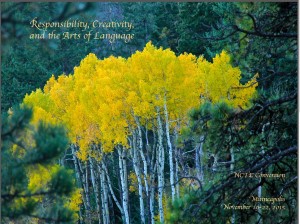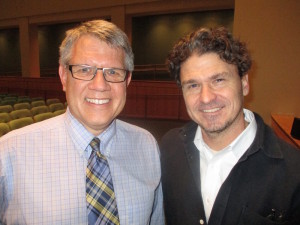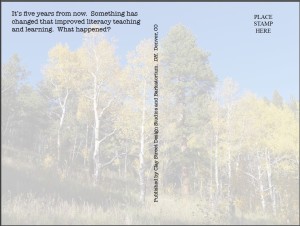Back to the Convention, Forward to the New Year
 December 20, 2015
December 20, 2015
With the holiday season swirling round, I hope not to overstay, like a bad fruitcake, this visit to your screen.
For 6000 NCTE members, the Minneapolis Convention seems now both yesterday and a season past. Like many others, I had the great fortune to meet our featured speakers individually. Alison Bechdel talked about her English teacher mother attending NCTE. She shared a paper that her mother had red-inked into submission, along with some of her comics and observations about the genre she chose.
Dave Eggers told a fun ny/poignant story of a young teen boy with a vision-occluding zit who audaciously proposed giving a speech on bicycling to the inner mantel of the earth (“because it would be downhill all the way”), only to have a remarkable teacher tell him to go for it. That teacher—Eggers’ own high school teacher, Peter Ferry—was in the audience and came to the stage with thunderous applause, where Eggers gave him the wrapped manuscript of his next book.
ny/poignant story of a young teen boy with a vision-occluding zit who audaciously proposed giving a speech on bicycling to the inner mantel of the earth (“because it would be downhill all the way”), only to have a remarkable teacher tell him to go for it. That teacher—Eggers’ own high school teacher, Peter Ferry—was in the audience and came to the stage with thunderous applause, where Eggers gave him the wrapped manuscript of his next book.
Chelsea Clinton told how reading as a child motivated her to write It’s Your World (free copies of which she signed for an hour afterwards), a precociousness she illustrated with a letter she wrote in the 1980s to Ronald Reagan.
Right before Bechdel’s talk, I gave the audience postcards and asked them to write: “It’s five years from now. Something has changed that improved literacy teaching and learning. What happened?” 742 members gave me their cards, and I’ve finished mailing back 338 to people who self-addressed them. First, though, I had the postcards transcribed. The responses fall into a number of intriguing categories, which I’ll tell you about down the road, but I was particularly struck by the many responses that imagined a significant reduction in high stakes testing.

Not long after the convention, of course, Congress passed and Obama signed a new bill to replace No Child Left Behind. The new Every Student Succeeds Act has hundreds of parts, but a key element is to return many responsibilities to the states, including how they adopt Common Core standards and how and when they administer tests. Whether NCTE members experience these changes as positive ones depends significantly, of course, on what their states choose to do with the latitude they’ve been giving. The NCTE Policy Analysts network will no doubt be busy.
So will the Policy and Advocacy Subcommittee of the Executive Committee. Each year, this group drafts an educational platform for NCTE and issues and strategies for advancing our mission. The subcommittee has been putting more attention on state and local advocacy, efforts. Most policies that affect teachers are developed at school, district, or state levels, a reality that the new ESSA underscores. Advocacy will be central focus at the 2016 CCCC convention and the 2016 Annual Convention.
Two other EC Subcommittees will shape NCTE over the coming year. One of them, “The Vertical Value of NCTE,” is charged with exploring how we can make better use of the vast sweep of an organization distributed into sections, conferences, affiliates, and so on. What connects us? Why might it matter to a middle school teacher that she belongs to the same association as a college professor—and vice versa? What can we accomplish together, for all the arts of language, that more focused groups cannot? I’ve asked this committee to think imaginatively and boldly.
A second EC Subcommittee will focus on “The Public Perceptions of NCTE.” We’ve historically done a fine job fostering among members and the profession the best current philosophies, research, and pedagogies about literacy in all guises. However, we’ve been perhaps less intentional in thinking how best to engage the American public itself: parents and the larger citizenry, even our students. The line between “publics” and “policymakers” is hardly bright and distinct. But I’ve asked this committee to set aside policymakers—school boards, departments of education, elected officials, and the like—and focus on those who aren’t officially authorized to make funding and other decisions.
From Denver,
Doug Hesse
